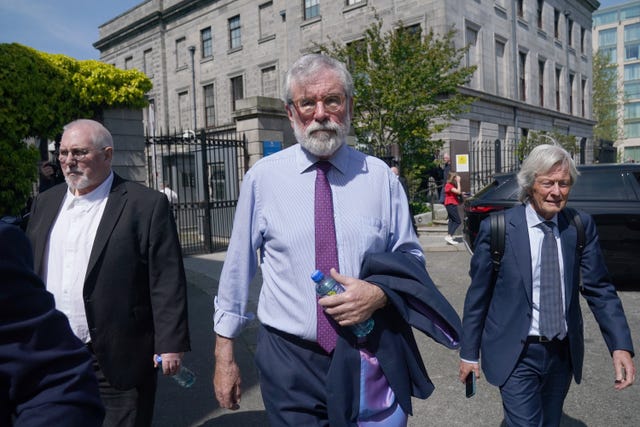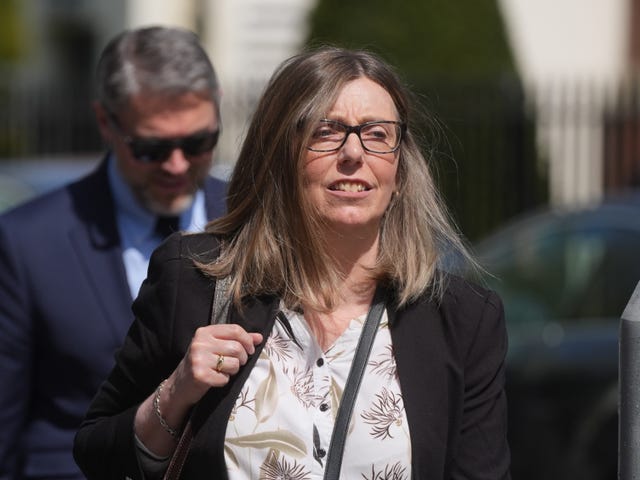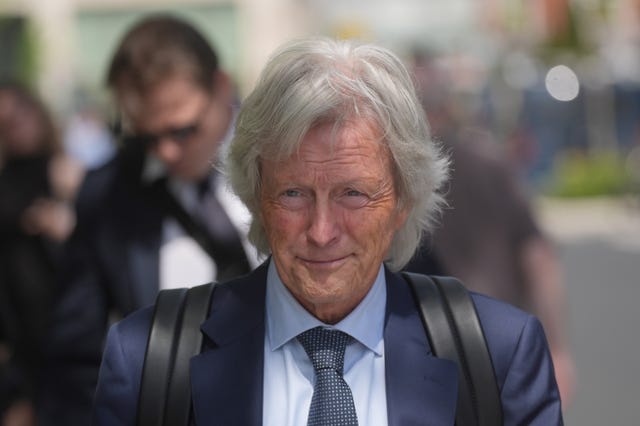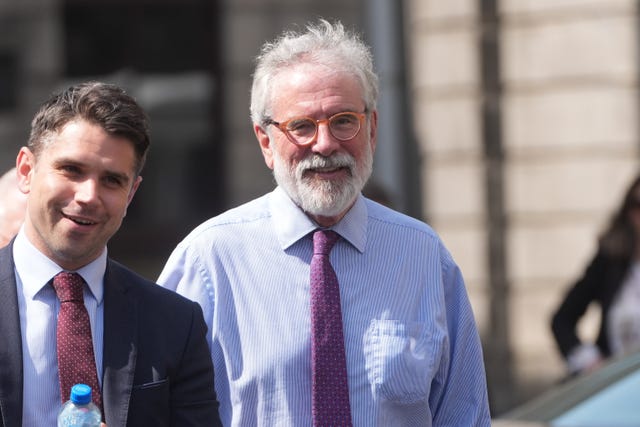Gerry Adams tells defamation trial that BBC programme was ‘hatchet job’
The former Sinn Fein president criticised a BBC broadcast that aired allegations that he sanctioned the killing of British spy Denis Donaldson.

Gerry Adams has called a BBC programme in which he claims he was defamed an “attempted hatchet job” that was “full of inaccuracies”.
He said he was “astonished” when he watched the programme, aired in September 2016, and called some of the events which were detailed “bogus and wrong”.
The former Sinn Fein president is suing the BBC over what he asserts are defamatory claims made in a 2016 Spotlight programme on who sanctioned the killing of Denis Donaldson, who was a British spy.
Sinn Fein member Mr Donaldson, 55, was shot dead at a cottage near Glenties in Co Donegal in April 2006, months after being exposed as an informer.
Mr Adams has denied the allegation that he had any involvement in ordering the murder.

On Wednesday afternoon, the jury was shown the Spotlight programme that aired in September 2016, which featured an interview with an anonymous source who said he was a former agent for the Special Branch.
The source, referred to as “Martin” on the programme, claimed that Mr Donaldson’s shooting had been sanctioned by the leadership of the republican movement.
Spotlight journalist Jennifer O’Leary said during the broadcast that it was understood that by 2006 Mr Adams had stepped aside from the IRA Army Council but it was Martin’s belief that he was still being consulted.
Martin said that based on his experience, murders must be approved by the political and military leadership of the IRA.
When asked by Ms O’Leary who he is referring to, he replied: “Gerry Adams, he gives the final say.”
The jury also heard extracts read from a BBC online article with the headline “Gerry Adams ‘sanctioned Denis Donaldson killing’”.

In the witness box, Mr Adams told the court he remembers watching the programme and being “astonished” at what he called “an attempted hatchet job” and “bad, poor journalism” – in particular the extracts where it is claimed he had a part in Mr Donaldson’s killing.
He said the article on the BBC website is still up nine years later and said “there was an arrogance involved” from the BBC who he said gave no reason why the article was still online.
He said the BBC had “encouraged other media to run with this stuff” and that the allegations gave “a stick to beat those” who wanted the peace process to work.
Mr Adams said the aired allegations that the IRA had killed Mr Donaldson and that he had sanctioned it created the impression that republicans had “been led up the garden path” by the peace process, because the IRA had told members to lay down arms and take up political or community work in the months before Mr Donaldson’s death.
Mr Adams said he put out a statement denying the allegations in the programme and contacted well-known libel lawyer Paul Tweed who sent letters to the BBC asking them to correct the record.
“We invited the BBC to retract what was said,” Mr Adams said.

In earlier evidence, Mr Adams said he “knew” and “liked” Mr Donaldson, who he had first met in Long Kesh and who worked as an administrator for Sinn Fein’s Stormont Assembly team.
But he said he did not have many dealings with him and that he was working “at another level within the party”.
Mr Adams described the raiding of Sinn Fein’s Stormont offices in 2002 and the subsequent arrest of Mr Donaldson and others as part of Stormontgate allegations, which Mr Adams said were “complete nonsense”.
He said that he was later informed by another member of Sinn Fein – Declan Kearney, of Sinn Fein’s branch in Northern Ireland – that Mr Donaldson was an informer for the Special Branch.
He said that during an interview with two senior members of Sinn Fein, “Denis acknowledged that he had been an agent and he had been an agent for 20 years”.

Mr Adams said he was not in touch with Mr Donaldson after he left the party, and said he was “shocked” when he received a phone call from the British secretary of state to say that Mr Donaldson had been found dead in April 2006.
By the time he got in touch with Mr Donaldson’s family, it had been made public that he had been killed.
Mr Adams said the people who Mr Donaldson had been an informer for had seen him as “expendable”.
“Personally, I think that Denis Donaldson was a victim of the conflict,” he told the court. “I don’t see any other way of describing it.”
He said that as a Louth TD for the Irish parliament, he continued to advocate on behalf of the Donaldson family and contacted the justice department several times on their behalf.
“I would continue to feel that a great injustice had been done to the Donaldson family,” he said.
He said this related to calls for an inquiry and “also the fact that they haven’t had satisfaction, not just in relation to the inquest, but in relation to the investigation into his killing”.
Opening the case on Tuesday, the barrister for Mr Adams, Tom Hogan SC, said the former Sinn Fein president’s reputation as a “peacemaker” had suffered an “unjustified” attack because of the broadcast of the BBC programme.
Mr Adams then entered the witness box and described his early political awakenings in Belfast in the 1960s.
This continued on Wednesday, where Mr Adams said the IRA was “a legitimate response” to what was happening in Northern Ireland at the time, but added that was “not to say that everything they did was legitimate”.
He became emotional as he spoke about the 1981 hunger strikers and outlined his and others’ efforts to pursue “an alternative way forward” to the IRA’s armed conflict.
Mr Donaldson’s family members watched proceedings via videolink.
The trial continues on Thursday before the jury and Mr Justice Alexander Owens.





